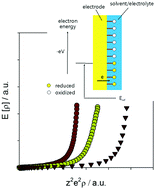Density functional theory and an experimentally-designed energy functional of electron density
Abstract
We herein demonstrate that capacitance spectroscopy (CS) experimentally allows access to the energy associated with the quantum mechanical ground state of many-electron systems. Priorly, electrochemical capacitance, C![[small mu, Greek, macron]](https://www.rsc.org/images/entities/i_char_e0cd.gif) [ρ], was previously understood from conceptual and computational density functional theory (DFT) calculations. Thus, we herein propose a quantum mechanical experiment-based variational method for electron charging processes based on an experimentally-designed functional of the ground state electron density. In this methodology, the electron state density, ρ, and an energy functional of the electron density, E
[ρ], was previously understood from conceptual and computational density functional theory (DFT) calculations. Thus, we herein propose a quantum mechanical experiment-based variational method for electron charging processes based on an experimentally-designed functional of the ground state electron density. In this methodology, the electron state density, ρ, and an energy functional of the electron density, E![[small mu, Greek, macron]](https://www.rsc.org/images/entities/i_char_e0cd.gif) [ρ], can be obtained from CS data. CS allows the derivative of the electrochemical potential with respect to the electron density, (δ
[ρ], can be obtained from CS data. CS allows the derivative of the electrochemical potential with respect to the electron density, (δ![[small mu, Greek, macron]](https://www.rsc.org/images/entities/char_e0cd.gif) [ρ]/δρ), to be obtained as a unique functional of the energetically minimised system, i.e., β/C
[ρ]/δρ), to be obtained as a unique functional of the energetically minimised system, i.e., β/C![[small mu, Greek, macron]](https://www.rsc.org/images/entities/i_char_e0cd.gif) [ρ], where β is a constant (associated with the size of the system) and C
[ρ], where β is a constant (associated with the size of the system) and C![[small mu, Greek, macron]](https://www.rsc.org/images/entities/i_char_e0cd.gif) [ρ] is an experimentally observable quantity. Thus the ground state energy (at a given fixed external potential) can be obtained simply as E
[ρ] is an experimentally observable quantity. Thus the ground state energy (at a given fixed external potential) can be obtained simply as E![[small mu, Greek, macron]](https://www.rsc.org/images/entities/i_char_e0cd.gif) [ρ], from the experimental measurement of C
[ρ], from the experimental measurement of C![[small mu, Greek, macron]](https://www.rsc.org/images/entities/i_char_e0cd.gif) [ρ]. An experimental data-set was interpreted to demonstrate the potential of this quantum mechanical experiment-based variational principle.
[ρ]. An experimental data-set was interpreted to demonstrate the potential of this quantum mechanical experiment-based variational principle.



 Please wait while we load your content...
Please wait while we load your content...